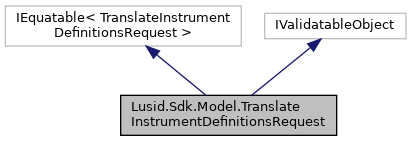A collection of instruments to translate, along with the target dialect to translate into. More...

Public Member Functions | |
| TranslateInstrumentDefinitionsRequest (Dictionary< string, LusidInstrument > instruments=default(Dictionary< string, LusidInstrument >), string dialect=default(string)) | |
| Initializes a new instance of the TranslateInstrumentDefinitionsRequest class. More... | |
| override string | ToString () |
| Returns the string presentation of the object More... | |
| virtual string | ToJson () |
| Returns the JSON string presentation of the object More... | |
| override bool | Equals (object input) |
| Returns true if objects are equal More... | |
| bool | Equals (TranslateInstrumentDefinitionsRequest input) |
| Returns true if TranslateInstrumentDefinitionsRequest instances are equal More... | |
| override int | GetHashCode () |
| Gets the hash code More... | |
Protected Member Functions | |
| TranslateInstrumentDefinitionsRequest () | |
| Initializes a new instance of the TranslateInstrumentDefinitionsRequest class. More... | |
Properties | |
| Dictionary< string, LusidInstrument > | Instruments [get, set] |
| The collection of instruments to translate. Each instrument definition should be keyed by a unique correlation id. This id is ephemeral and is not stored by LUSID. It serves only as a way to easily identify each instrument in the response. Any instrument that is not already in the LUSID dialect should be given as an ExoticInstrument. More... | |
| string | Dialect [get, set] |
| The target dialect that the given instruments should be translated to. More... | |
Detailed Description
A collection of instruments to translate, along with the target dialect to translate into.
Constructor & Destructor Documentation
◆ TranslateInstrumentDefinitionsRequest() [1/2]
|
inlineprotected |
Initializes a new instance of the TranslateInstrumentDefinitionsRequest class.
◆ TranslateInstrumentDefinitionsRequest() [2/2]
|
inline |
Initializes a new instance of the TranslateInstrumentDefinitionsRequest class.
- Parameters
-
instruments The collection of instruments to translate. Each instrument definition should be keyed by a unique correlation id. This id is ephemeral and is not stored by LUSID. It serves only as a way to easily identify each instrument in the response. Any instrument that is not already in the LUSID dialect should be given as an ExoticInstrument. (required). dialect The target dialect that the given instruments should be translated to. (required).
Member Function Documentation
◆ Equals() [1/2]
|
inline |
Returns true if objects are equal
- Parameters
-
input Object to be compared
- Returns
- Boolean
◆ Equals() [2/2]
|
inline |
Returns true if TranslateInstrumentDefinitionsRequest instances are equal
- Parameters
-
input Instance of TranslateInstrumentDefinitionsRequest to be compared
- Returns
- Boolean
◆ GetHashCode()
|
inline |
Gets the hash code
- Returns
- Hash code
◆ ToJson()
|
inlinevirtual |
Returns the JSON string presentation of the object
- Returns
- JSON string presentation of the object
◆ ToString()
|
inline |
Returns the string presentation of the object
- Returns
- String presentation of the object
Property Documentation
◆ Dialect
|
getset |
The target dialect that the given instruments should be translated to.
The target dialect that the given instruments should be translated to.
◆ Instruments
|
getset |
The collection of instruments to translate. Each instrument definition should be keyed by a unique correlation id. This id is ephemeral and is not stored by LUSID. It serves only as a way to easily identify each instrument in the response. Any instrument that is not already in the LUSID dialect should be given as an ExoticInstrument.
The collection of instruments to translate. Each instrument definition should be keyed by a unique correlation id. This id is ephemeral and is not stored by LUSID. It serves only as a way to easily identify each instrument in the response. Any instrument that is not already in the LUSID dialect should be given as an ExoticInstrument.
The documentation for this class was generated from the following file:
- /home/docs/checkouts/readthedocs.org/user_builds/lusid-sdk-csharp/checkouts/latest/sdk/Lusid.Sdk/Model/TranslateInstrumentDefinitionsRequest.cs